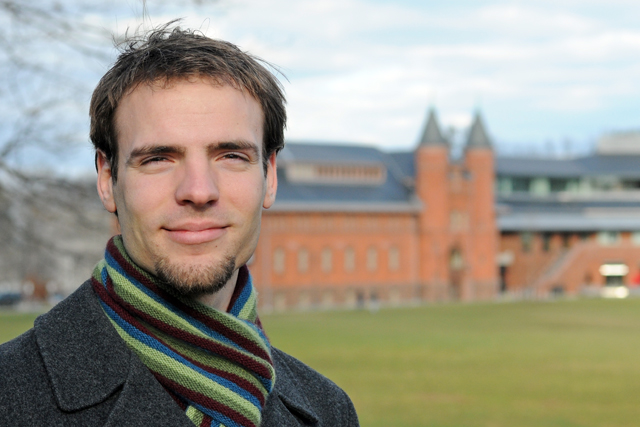EE&S Major Lief Friedrichs ’14 Interested in Permaculture, Sustainability

Q&As with outstanding students is an occasional feature of The Wesleyan Connection. This issue we speak with Lief Fredrichs from the Class of 2014.
Q: Lief, where are you from, and why did you choose Wesleyan?
A: I am from Exeter, NH. I chose Wesleyan because, when I visited, the students (actually tour-guides) seemed the most real to me. I liked Wes because of its reputation for being a small and prestigious school. I applied and got accepted off the waiting list in July. I was planning to go to Bard College, but I decided that I couldn’t pass up the chance to come here.
Q: You recently had an op-ed published in the Exeter News-Letter where you discuss pollution prevention in New Hampshire’s Great Bay estuary. What prompted you to write this piece?
A: I wrote this letter as a project for my Introduction to Environmental Studies class. I decided to submit it out of family legacy/pressure. I was the only person in my family who had yet to write an op-ed for the town paper. I guess childhood memories had a part in it, too. There was a big discussion about the health of the estuary and new EPA regulations that would force the town to spend $60 million on a new wastewater treatment plant. I felt like like the situation would end up becoming expensive and ultimately unresolved so I decided to write about some of the things I have learned since coming to Wes.
Q: What is the message you hope readers took from your article?
A: I hope that readers will seriously consider the effects that they have on the local environment. The Great Bay is under federal protection, but a lot of the area’s ecosystems have suffered from traditional development and reduction in habitat for wildlife.
Q: What classes or professors have been most instrumental in your decision to study environmental science at Wesleyan?
A: Both Professor Johan Varekamp and Professor Kim Diver are great to take a class with. I am enrolled in their classes this semester, but I decided on the major in the first week of freshman year. I chose earth and environmental sciences as a major because I liked its course distribution and I heard good things about it from upperclassmen.
Q: You’re a member of Wesleyan’s intelligent landscape design group, WILDWes. Why did you become involved, and what project are you involved with?
A: I got involved in WILDWes last year through Wesleyan’s Environmental Organizers Network. The two students who founded the group, Miles Bukiet ’11 and Sam Silver ’11, were two fun cats to hang out with and to be passionate about doing something good on campus. Right now, WILDWes has just finished designing a new landscape for the West College courtyard. This fall we sheet-mulched the site, which ended up taking a lot of time. We will begin planting fruit trees, grasses, shrubs, and many other plants in the spring.
Q: What are your hobbies?
A: I am interested in too many things. I guess I have kept away from committing to anything yet, so I can’t say that I have regular hobbies on campus. My interest in permaculture, a holistic approach to design that values efficiency, social justice, and environmental quality, is probably my main drive for being involved in WILDWes. Now that I think of it, I am interested in looking at what it means to be human. I end up observing people and trying to analyze what drives them in life. I guess that’s one of my hobbies.
Q: You’ll be graduating in less than two years. What are your post-Wesleyan plans?
A: Well, grad school. I’ve sort of come to the conclusion that coming to Wes has set me up to pursue an academic career, at least until I’m out of my 20’s. Other than that, I would like to travel and try out different types of careers and places to live.

